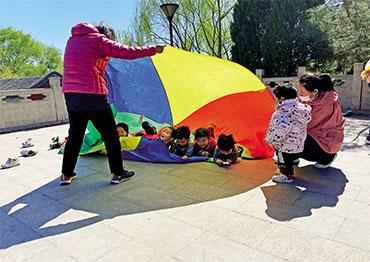Zhang Yan said they want to give agency to the parents, not hand them solutions on a plate. “There’s no savior. We’re not a savior either. They need to be their own saviors,” Zhang said.
Parents initially had trouble accepting this approach. Many have to stand at their market stall all day long, leaving them little extra time and energy to teach. So volunteers would go to their stalls after school to discuss their children and family situation. The volunteers sometimes helped watch the stalls to free them up. Gradually, these parents, who previously were only focused on their livelihoods, paid more attention to their children’s education. They kept journals and engaged with other parents. Those who stood out were selected as honorary presidents of the school.
“In creating the playgroup, equal partnerships in which all involved can dialogue is the first step. The parent committee has been critical to playgroup from the beginning,” Zhang Yan said.
Zhang Yixue, one of the parent-teachers, told NewsChina that the group has helped enlighten many parents about education. “When children graduate from the school, so do the parents,” she said.
He Xiang, who sells seasonings at a food market, was president of Sihuan Playgroup for four years. He wrote a lot of parenting journals, once detailing how he resisted the urge to scold his son after he spilled an entire bag of peanuts, a show of respect and patience. Parents were developing new strengths, just as Zhang Yan and her students intended.
Approaching retirement in 2011, 60-yearold Zhang Yan, enrolled her last cohort of graduate students at her university, a major source of playgroup volunteers. Since then, it has been more important to recruit teachers from among the parents.
Ding Fengyun, whose daughter Nini attended the playgroup, was the second parent-teacher. After she had children, she worked part time as a housekeeper. At first, she was not confident. But Zhang Yan encouraged her, organizing weekly classes for volunteers and teachers where they could discuss problems and make lesson plans. During her eight years at the playgroup, Ding earned a bachelor’s degree and her preschool teaching certificate. In 2021, she moved away and left the playgroup. She now directs a private childcare center.
The playgroup has trained eight parent-teachers, three of whom are still working there full time. They write articles about the children’s progress for a Japanese website on early child education. The website started publishing the articles over 10 years ago and pays them US$20,000 every year.
Liu Xiangying, professor of comparative education at Fukuyama City University in Japan, has visited Sihuan Playgroup many times with her students. She feels that while encouraging parents to be teachers might be the only choice for the playgroup, they are as good as, or even better than, teachers with professional training because they embody the essence of preschool education – “they care for the children.���
Even if they attend preschool in Beijing, most children of migrant workers who do not have a Beijing residency permit eventually return to their hometowns for education, since they can only take examinations, including for university entrance, in the place they are registered, which is usually where they were born. But for Sihuan’s students, their experience has far-reaching influence on their lives.
Nini, who is now in her second year of middle school, talks of happy times at the playgroup that made her feel positive about school in general. The president sold herbs and spices, while the writer of their school song sold steamed buns. The students, though of different ages, formed close bonds. She is not intimidated by teachers or going to school. She remembers the playgroup would assign a story every day for bedtime reading. Her parents were too busy to read to her, so she read by herself and gradually developed a reading habit.
Aware of the significance of companionship for children, He Xiang returned with his children to his hometown in Hunan Province in 2014, even though they could have stayed with their grandparents. In 2016, He returned to Beijing to attend the Sihuan Playgroup’s 12th anniversary. “The days in the playgroup have influenced parents and children for life,” He said.

 Old Version
Old Version

